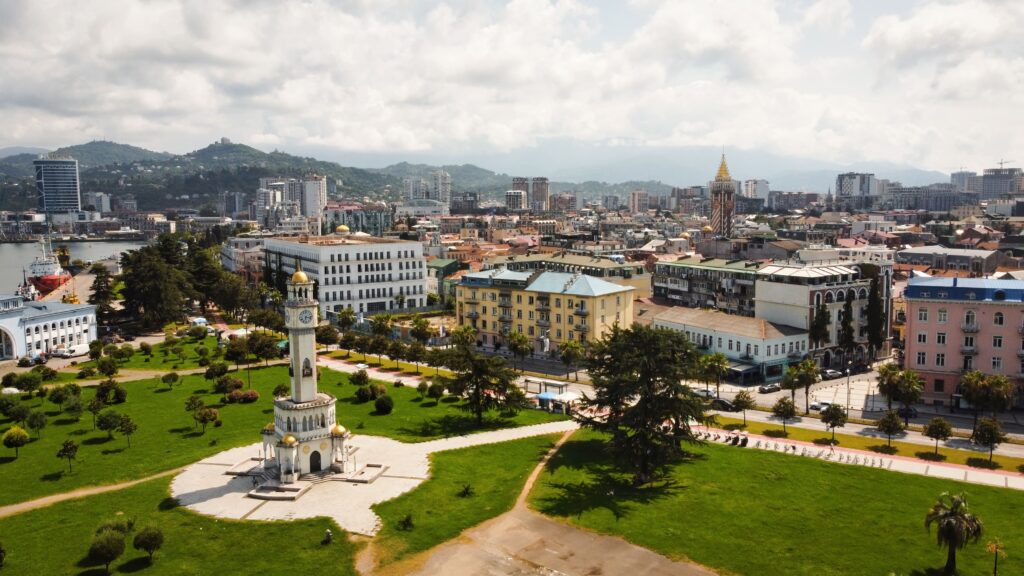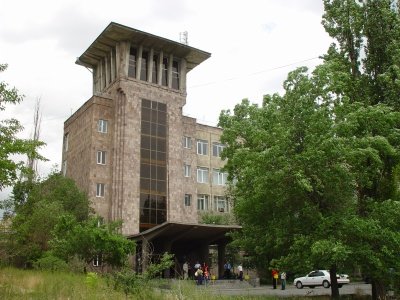MBBS In Armenia
— Tenacity Education
About Armenia
Armenia is a landlocked country in the South Caucasus region of Eurasia. With a rich and ancient history, Armenia is known for its cultural heritage and historical sites. The country is nestled between Turkey, Georgia, Azerbaijan, and Iran, offering a blend of influences from both Eastern Europe and Western Asia. Armenia boasts a stunning natural landscape, with rugged mountains, picturesque valleys, and the beautiful Lake Sevan.

Best University In Armenia

Yerevan State Medical University
Yerevan State Medical University (YSMU) is a renowned medical institution located in the capital city of Armenia, Yerevan. Established in 1920, it is one of the oldest and most prestigious medical universities in the country. YSMU is recognized for its commitment to providing high-quality medical education and producing competent healthcare professionals.

Mkhitar Gosh Armenian-Russian International University
The Mkhitar Gosh Armenian-Russian International University was founded in 1996 is located in Yerevan at 30a Tigran Mets Ave, Vanadzor 2001, Armenia, the capital city of Armenia. The university emerges to be the best top university of Armenia for furnishing high-quality education to the students in the arena of Medicine.

Tereza Medical University
St. Tereza’s Medical University of Yerevan, otherwise called St. Theresa Charitable Sisters Medical Institute, is a private therapeutic instruction foundation in Yerevan, Armenia, set up in 1992. St. Tereza Medical University is the primary Medical University to begin English Medium Medicine course in Yerevan, as per ECTCS 360 Credits and offers the STUDENTS

University Of Traditional Medicine
Founded in the 90’s, the college is one of the higher instructive foundations that was granted the most elevated status- “The State Accreditation” from the Government for its high picture in logical, academic and instructive exercises. The graduates of the university get State Diploma.

Yerevan Haybusak University
Yerevan “Haybusak” University was founded by academician Levon Harutyunyan in 1991. It had three faculties which offered studies in Medicine, Economics and Food Technology. In 1997 the Faculty of Humanities was opened, in 2000 the Institute of Oriental Studies
Fact About Armenia
Armenia is a landlocked country located in the South Caucasus region of Eurasia. Here are some facts about Armenia:
Ararat: Mount Ararat, located in eastern Turkey near the Armenian border, is an iconic symbol of Armenia. Although it is situated outside the country’s borders, it holds immense cultural and historical significance for Armenians.
Lake Sevan: Armenia is home to Lake Sevan, one of the largest high-altitude lakes in the world. It is situated at an altitude of 1,900 meters (6,234 feet) above sea level and is known for its stunning beauty. The lake is a popular tourist destination and offers opportunities for swimming, fishing, and boating.
Matenadaran: Yerevan is home to the Matenadaran, an ancient manuscript repository and research institute. It houses one of the world’s richest collections of medieval manuscripts, including religious texts, scientific treatises, and literary works.
Tatev Monastery: The Tatev Monastery, located in the Syunik Province of Armenia, is a historic architectural marvel. It is perched on a cliffside, and its intricate design and breathtaking location make it a popular tourist attraction. The monastery is accessible via the Wings of Tatev, a cable car that holds the Guinness World Record for the longest non-stop double track cable car.
Apricot: Armenia is often referred to as the “Land of Apricot.” Apricots have a long history in Armenian culture, and the country is known for producing high-quality apricots. The apricot tree is considered a symbol of fertility and abundance in Armenian folklore.
Why Study in Armenia
Studying in Armenia can offer several advantages and opportunities for students. Here are some reasons why studying in Armenia might be a good choice:
Quality Education: Armenia has a strong education system with a focus on academic excellence. The country has reputable universities and educational institutions that offer quality programs and degrees in various fields.
Affordable Tuition Fees: Compared to many other countries, the cost of education in Armenia is relatively affordable. Tuition fees and living expenses in Armenia can be more budget-friendly for international students.
Diverse Study Programs: Armenia provides a wide range of study programs and disciplines to choose from. Whether you’re interested in humanities, sciences, engineering, arts, or business, you can find suitable courses and degrees in Armenia.
Cultural and Historical Heritage: Armenia has a rich cultural and historical heritage. Studying in Armenia allows you to immerse yourself in a unique and ancient culture. You can explore historical landmarks, visit ancient monasteries, and experience traditional Armenian arts, music, and cuisine.
Strategic Location: Located at the crossroads of Europe and Asia, Armenia offers a strategic location for students. It serves as a bridge between different regions and cultures, providing opportunities for networking, cultural exchange, and international collaborations.
Scholarships and Funding Opportunities: Armenian universities and the government offer various scholarships and funding opportunities for international students. These can help alleviate the financial burden of studying abroad.
Multilingual Environment: While Armenian is the official language, many universities in Armenia offer courses in English, making it accessible for international students. Additionally, studying in Armenia provides an opportunity to learn or improve your language skills, as the country is multilingual.
Emerging Technological Hub: Armenia has gained recognition as an emerging hub for technology and innovation. The country has a growing tech industry and is home to numerous startups and IT companies. Studying in Armenia can provide access to technological advancements and networking opportunities in the field.
Warm and Welcoming Environment: Armenians are known for their warm hospitality and friendliness towards visitors. Studying in Armenia can provide a supportive and welcoming environment, making it easier to adapt to a new country and culture.
International Student Community: Armenia attracts a diverse community of international students from various countries. Studying in Armenia allows you to interact with students from different backgrounds, fostering cultural exchange and lifelong friendships.
It’s important to research specific universities, programs, and admission requirements in Armenia to determine if it aligns with your educational goals and interests.
Education System in Armenia
1. Primary Education:
- Primary education in Armenia is compulsory and free for all children between the ages of 6 and 16.
- It typically consists of four years of primary school (grades 1-4).
2. Basic Education:
- Basic education in Armenia comprises two cycles: the first cycle and the second cycle.
- The first cycle covers grades 5-8, while the second cycle covers grades 9-12.
- At the end of the second cycle, students take the Unified State Examination (USE), which determines their eligibility for higher education.
3. Vocational Education:
- After completing basic education, students have the option to pursue vocational education and training (VET) programs.
- VET programs provide practical skills and training in various fields, preparing students for specific professions and occupations.
4. Higher Education:
- Higher education in Armenia is offered by universities, institutes, and colleges.
- The academic year typically begins in September and consists of two semesters.
- Bachelor’s, Master’s, and doctoral degrees are awarded in various disciplines.
- Admission to higher education institutions is competitive and usually requires the successful completion of the Unified State Examination (USE) or other entrance exams.
5. Accreditation and Quality Assurance:
- The quality of higher education in Armenia is monitored and evaluated by the National Center for Professional Education Quality Assurance Foundation (ANQA).
- ANQA ensures that educational institutions meet certain standards of quality and provides accreditation to institutions and their programs.
6. Specialized Education:
- Armenia also offers specialized education institutions that focus on specific fields, such as fine arts, music, dance, and sports.
- These institutions provide specialized training and education to students who have talents or interests in these areas.
Student Life in Armenia
Vibrant Campus Communities: Universities in Armenia often have vibrant campus communities with numerous student organizations, clubs, and extracurricular activities. This allows students to engage in various social, cultural, and academic activities.
Cultural and Social Events: Armenia has a rich cultural heritage, and students have the opportunity to participate in and experience cultural festivals, concerts, exhibitions, and performances. These events provide a chance to explore Armenian traditions, music, dance, and arts.
Sporting Activities: Many universities in Armenia have sports facilities and offer opportunities for students to engage in sports and physical activities. Students can participate in intramural sports, join sports clubs, or represent their universities in inter-university sports competitions.
Student Support Services: Armenian universities provide various support services to help students succeed academically and personally. These may include academic advising, counseling services, career development support, and mentorship programs.
International Student Community: Armenia attracts a diverse community of international students from different countries. Interacting with students from various cultural backgrounds fosters cross-cultural friendships and exchange of ideas, enriching the overall student experience.
Affordable Living Costs: Armenia is known for its relatively affordable living costs compared to many other countries. This makes it more feasible for students to manage their expenses and enjoy a comfortable student life.
Exploration and Travel Opportunities: Armenia’s strategic location in the South Caucasus region provides students with opportunities to explore neighboring countries, such as Georgia, Iran, and Turkey. Weekend trips or longer breaks can be spent discovering historical sites, natural landscapes, and experiencing diverse cultures.
Safety and Hospitality: Armenia is generally considered a safe country for students. The local population is known for its warm hospitality, which contributes to a welcoming and supportive environment for international students.
Networking and Career Opportunities: Studying in Armenia can provide students with networking opportunities, including connections with professors, professionals, and alumni. These connections can be valuable for internships, job placements, and future career prospects.
Disadvantages of MBBS in Armenia
Limited Recognition: The medical degree obtained in Armenia may have limited recognition in some countries, which could pose challenges if graduates plan to practice medicine or seek employment opportunities outside of Armenia.
Language Barrier: The primary language of instruction in medical universities in Armenia is often Armenian or Russian. International students who are not fluent in these languages may face difficulties understanding lectures, participating in clinical rotations, or communicating effectively with patients during their practical training.
Cultural Adjustment: Adjusting to a new culture and way of life can be challenging for some international students. Adapting to different customs, social norms, and lifestyles might require time and effort.
Weather Conditions: Armenia experiences harsh winters, with cold temperatures and heavy snowfall. Students coming from warmer climates may find it challenging to adjust to the cold weather and may need to make additional preparations for the seasonal changes.
Limited Clinical Exposure: While the theoretical education in Armenian medical universities may be satisfactory, some students express concerns about limited clinical exposure during their MBBS studies. This could potentially impact their practical skills and preparedness for medical practice.
Distance from Home: For international students, studying MBBS in Armenia means being far away from their home country and families. Homesickness and the emotional aspect of being away from familiar surroundings can be a challenge for some students.
Challenges in Licensing and Residency: Depending on the country of origin, obtaining licenses and securing residency positions in some countries after completing an MBBS degree from Armenia may involve additional requirements, exams, or hurdles.
